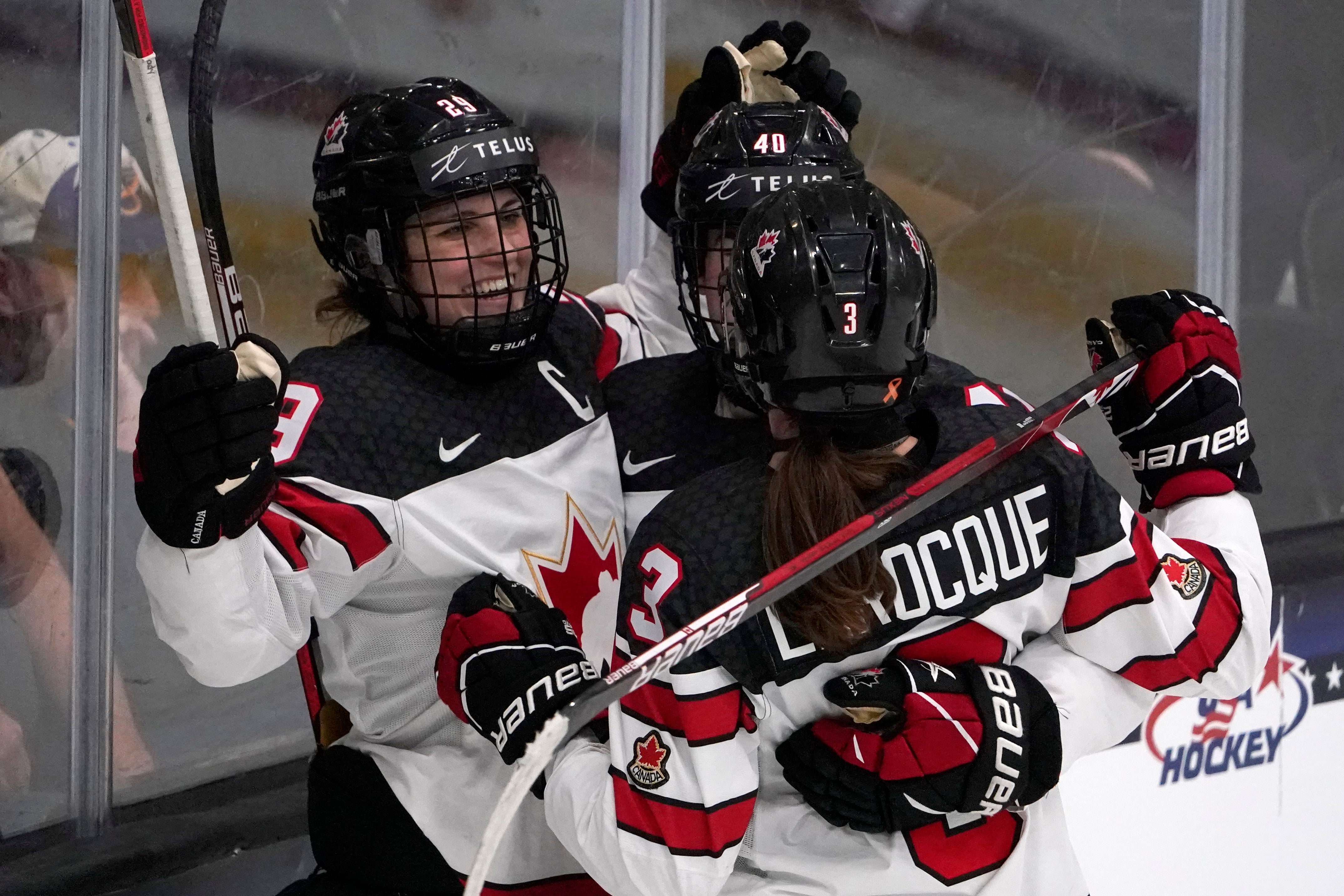Poulin, Canada's Captain Clutch, set for 4th Winter Games
Marie-Philip Poulin grew up in modest surroundings in smalltown Quebec to become one of Canadian women's hockey's top players

Marie-Philip Poulin will always remember watching members of Canada’s women’s hockey team burst into tears as they celebrated their Olympic gold-medal win over the United States at the 2002 Salt Lake City Winter Games.
Poulin, 10 at the time, turned to her mother on the couch at their home in Beauceville, Quebec to ask why everyone was crying.
“And she said, `One day you might know,'” Poulin recalled.
Eight years later at the Vancouver Games, as the youngest female hockey player ever to represent Canada at the Olympics, Poulin got an opportunity to appreciate her mother’s words.
“I knew what she meant at that moment,” she said. “It was special.”
Extra special, perhaps, given how Vancouver was where Poulin began establishing her reputation as Canada’s “Captain Clutch,” and eventually drawing comparisons to Sidney Crosby by scoring both goals in a 2-0 championship-clinching victory.
Four years later in Sochi, she did it again, scoring the tying goal in the final minute and then again in overtime in Canada’s 3-2 win over the U.S. for another gold Then came this past August, when Poulin scored in overtime — the puck went in so fast it wasn’t ruled a goal until after a review — to secure a 3-2 win over the Americans in the world championship final to end the U.S.‘s five-tournament run of victories.
At 30 — don’t remind her — Poulin is preparing to make her fourth Olympic appearance and second as team captain at the Beijing Games.
She is the unquestioned leader of what is a mostly veteran team featuring 13 players with Olympic experience. And while beating the Americans at the worlds was a start, Poulin and the Canadians have unfinished business to attend to after losing to the U.S. in the final the 2018 Olympics in South Korea.
It’s no coincidence, after Canada lost consecutive games to the Americans during their pre-Olympic rivalry series in November, that it was Poulin who responded by scoring overtime goals in each of the following two games.
“We’ve been working for this moment and waiting for this game since the last two,” Poulin said after a 2-1 win on Dec. 15. “This was a great time to turn it around.”
Her teammates were hardly surprised.
“Being able to rise to the high-pressure situation as a group, and especially having our captain lead the way, it’s huge for us,” forward Emily Clark said following a 3-2 win two days later. “She’s the heartbeat of our team.”
In 70 career games against the U.S., Poulin is the team’s active leader with 27 goals and 46 points. Overall, she ranks seventh on Canada’s career list with 162 points (78 goals, 84 assists) in 145 international games, and eighth with 18 points (11 goals, seven assists) in 15 Olympic games.
“She shows up in the biggest moments,” said Hockey Hall of Fame member Jayna Hefford, who played with Poulin in 2010.
“She can go out and play really well, and that’s what you expect from her. But then those moments arise and all of a sudden she takes it to another level,” Hefford added. “She’s done it time and time again. And so I think that’s secured her legacy.”
Poulin carries herself with a quiet modesty, playfully giggling when her nickname is mentioned.
“Yes, it’s happened a couple of times, but I know there’s days that it doesn’t go your way,” she said. “It’s hard to put into words. But one thing I always came up with is it’s my surroundings, my environment, my people, my teammates, my friends, my family.”
One of Canada’s most celebrated hockey players grew up in modest surroundings in a town of about 6,300, closer to Maine’s northwestern border than the hour-long drive north to Quebec City. She took to hockey at a young age, following in the footsteps of her older brother, Pier-Alexandre.
With no girls’ hockey program in town, Poulin played on boys’ teams until she was 15, when she moved to Montreal. That’s where she stayed with family friends, developed her game and began learning English in her bid to earn a scholarship at a U.S. college.
Poulin went on to play at Boston University where she helped the Terriers win four consecutive Hockey East titles and made two Frozen Four appearances, losing both.
“Obviously, it was not easy times. There’s moments you ask yourself why? If I made the right decision when I was struggling in school,” Poulin said of living in Montreal. “But I had a lot of people who wanted me to succeed, and I think that really helped.”
Poulin recalled times when she would attend team parties at a local restaurant and being limited to what she could order because her parents could only afford so much. While others got to drink Coke, she’d have water. Dessert was a luxury.
“I didn’t come from a wealthy family, and they had to work two jobs to make sure my brother and I would play what we loved the most. And that’s something we’re so thankful for,” she said. “It’s beautiful what they did for us. And to be honest, I would take that water and that meal any day.”
It was at the Vancouver Games following Canada’s victory, and with her family around her, when Poulin truly came to appreciate their sacrifices.
“I was able to actually share that gold medal with them, and we all were tearing up, all crying,” Poulin recalled. “It was like, finally, we can share together all the hard work that we all did in our own way.”
The tears she once saw on television flowed with unrestrained emotions of joy.
“At that moment,” Poulin said, “it was our gold medal.”
___
More AP Winter Olympics: https://apnews.com/hub/winter-olympics and https://twitter.com/AP_Sports
Bookmark popover
Removed from bookmarks